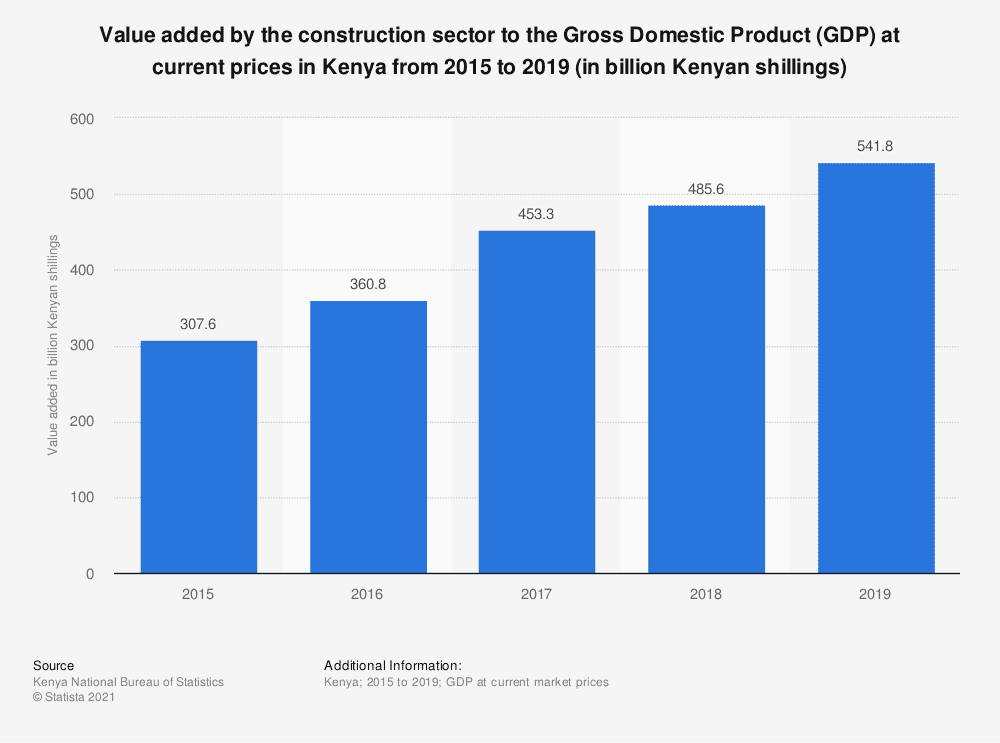Covid 19 has severely disrupted the worldwide economy. The pandemic has simultaneously affected many institutions With devastating effects. The most affected sectors in Kenya include the financial institutions, households, businesses, industrial infrastructure companies and establishments. This has caused a dramatic loss of jobs and livelihood worldwide.
The pandemic presents all industries with an unprecedented challenge. It is disrupting the social and economic existence and many countries. As a result, several construction companies have gained nothing during the pandemic period but losses, which negatively impacts the Kenyan economy. Overall, the construction sector took a terrible turn. Tens of companies and construction enterprises face an existential threat.
Industry performance
While the Construction sector in Kenya seems to be severely impacted by the Covid-19 pandemic, according to statistics, from 2015 to 2019, the industry has added value to the Kenyan GPD.
Statistics show that as of 2019, “the construction sector added a value of 541.8 billion Kenyan shillings (Kshs) (roughly 5 billion U.S. dollars) to the Country’s Gross Domestic Product (GDP). The amount increased in comparison to the precedent year when the value-added was measured at 485.6 billion Kshs (around 4.5 billion U.S. dollars)”.

During this time, the sector was largely supported by the commercial and residential buildings and not the infrastructure sector. However, things have changed since the onset of the pandemic.
Impacts of covid 19 on the construction sector
As the number of pandemic victims continues to increase, so, does its impact on the construction sector. Companies, building owners and investors are facing financial recession and have trouble keeping contracts and meetings deadlines. Different sectors in the construction industry have been affecting by the Covid 19. These sectors include:
supply chain management
The major interruptions in this sector include lower demand housing, shorter working hours, and the decline in
construction materials due to supply disruptions. The sector is also impacted mostly by the lockdowns. For instance, the total lockdown a few months ago affected the supply chain in the industry since materials could not reach manufactures in time.
The raw materials come to the manufactures and factories via road, air, or water. Due to the lockdown, materials could not reach factories, manufacturers and even construction sites which meant construction companies, investors, and other persons involved with construction suffered losses.
Financial issues
As the government pulls together funds from other sectors to deal with the scourge of the pandemic and respond to emergency interventions, these sectors suffer from a lack of funding. Also, companies suffered losses due to a lack of materials at the site, which led to a financial crisis. Closure of the site during the lockdown also led to huge losses.
Transportation issues
The lockdown also brought about transportation issues in the sector. The total lockdown or curfews led to transportation issues, which impacted how the materials get to the site and how long it takes. That was one reason why many sites closed, and work stopped.
inflation
Inflation plays a crucial part in the price increase, machinery, materials and labour which results in the initial and final cost of the project. Though the country experienced low inflation in June and October, the country is experiencing an increase, in April, Kenya registered a 5.86 inflation. Though lower than the 7.17% experienced in February 2020, there is an expected increase in the months to come.
Remedial measures
The uncertainty created by the coronavirus in almost all industries in Kenya needs some remedial measures to rescue the economy from going downhill. Remedial measures may include:
Comply with WHO and government guidelines
Construction workers face an elevated risk of COVID 19 due to close-knit worksite conditions. To protect workers from covid 19, the institute of engineers and other related bodies in Kenya came up with guidelines that everyone in the construction industry should adhere to. These guidelines are:
- Carry out temperature checks and record upon entry into the site
- Availing running water, soap and sanitizers at the construction site entry and exit points for workers to wash their hands regularly.
- Reduce close contact as much as possible
- Reports any suspicious incidences as soon as possible and provide isolation room for workers
Wear safety equipment
It is always advisable to wear PPEs such as safety boots, reflectors, gloves, and helmets whenever you are on the site. With covid 19 surges, a mask is now part of our livelihood, and it should be the case on construction sites. Workers must always wear masks to protect themselves, not only from the virus but also from dust and other chemicals used at the site.
Workplace fumigation and sanitization.
Fumigation allows for the removal of bacteria, viruses, and other harmful micro-organisms. Companies should also put disinfectants or antiseptics bottles in their offices and at the sites to ensure everyone sanitizes before entering the premises and the site. It also advisable to clean and sanitize the workplace every day.
Maintain social distancing
As mentions in the covid 19 guidelines provided by the government, maintaining social distancing is a must. According to the guidelines, a minimum of one-meter distance is needed.
Remote working
The pandemic has taught us about remote working and people have embraced it. Many people worked from home during the lockdown and some still do to avoid contracting the virus. Construction workers are no different, especially those who work at the office. If possible, workers can work from home, hold meetings online, sign contracts digitally, send emails, fill google forms and do designing, planning, cost estimation from home.
The Upside
The construction industry is likely to witness a slow, long, and uneven recovery by the year 2024. According to reports, the industry is expected to record a CAGR of 10.4% to reach KES 1023.4 billion by 2024. The residential construction industry in value terms increased at a CAGR of 9.0% during 2015-2019.
Also Recently, Kenya and UK signed an Sh20 billion deal that will be channelled toward the construction industry. According to sources, the move he secured was to help resuscitate the ailing Kenyan economy by boosting, “small and medium-sized firms paralyzed by the pandemic”.
Conclusion
Covid 19 is doing a lot of damage to economies. The devasting pandemic severely impacted the construction industry. However, recent communications show that there is light at the end of the tunnel.
The construction industry, in particular, has welcomed some positivity. Looking ahead, the industry is set to recover as the lockdown eases in some parts of the country allowing for sites to reopen as long as people adhere to the guidelines by WHO and the Kenyan government.
As part of the construction family in Kenya, We concentrate on health and safety and workers’ wellbeing. Moreover, we advocate for site health and safety to our clients to adhere to relevant authorities and guidelines until the situation normalizes.

